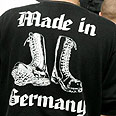
NPD supporter
צילום: רויטרס
Fairytale German town fights neo-Nazis
Christmas lights are on, policemen on a mission: To stop neo-Nazi violence
The Christmas market in this medieval German town could be off a page in a children's picture book. The sugary smell of "Gluehwein" (mulled wine) wafts over wooden stalls selling toys and gingerbread while children sway to seasonal songs. Christmas lights illuminate the half-timbered houses around the square.
Last Saturday evening, three burly policemen stood under those fairy lights clutching truncheons.
Their job: To stop neo-Nazi violence.
Sure enough, a couple of hours later bottles started flying, a scuffle ensued and an ambulance drew up. The chatty waitress in a restaurant under Quedlinburg's town hall suddenly became flustered and locked the door, keeping her customers inside.
"Sorry, this has been happening a bit lately," she said, mentioning a neo-Nazi attack last weekend on some teenagers.
In statistics which make alarming reading given Germany's Nazi history, right wing-motivated violence is on the rise in the country as a whole and especially in the former east German state of Saxony-Anhalt.
More attacks
The "Miteinander" (together) victim support group registered 110 right wing-motivated acts of violence in the first half of this year in Saxony-Anhalt. That was more than in any other state and compared to 129 incidents in the whole of 2005.
Police in Quedlinburg have reacted by installing video cameras, reinforced the number of officers on night duty, launched a campaign to help the community recognize politically motivated crime and are trying to react more quickly when incidents occur.
"The aim is to get quick convictions for perpetrators," said a police spokesperson. He said the far-right scene was not well-organized and police know the individuals involved.

NPD rally in Germany (Photo: Reuters)
The UNESCO world heritage site of Quedlinburg counts as one of Germany's prettiest towns. According to folklore, the nearby Harz mountain range is home to witches and woodland spirits.
But during the day, it is the neo-Nazis who make their presence felt.
Hanging around the square, they are recognizable by their skinhead haircuts, military clothing with far-right slogans like "Stahlgewitter" (storm of steel) and Burberry caps.
Recent incidents in the region include a teenager who was forced to wear a sign saying he was a Jew, a punk rock fan who lost an eye after being beaten and the well-documented burning of the diary of Holocaust victim Anne Frank in July.
Statistics show racist attacks are rife in Saxony-Anhalt where unemployment was about 16.5 percent in October compared with 9.8 percent in Germany as a whole.
Non-German faces are noticeable by their absence.
Institutional problem
In the country overall, the number of extreme right wing crimes jumped 20 percent in the first eight months of 2006.
Germany needs to confront its right-wing culture because it is an institutional problem, says Miteinander's Heike Kleffner.
"The extreme right's prejudices and hatred of minorities mirrors the prejudices of some of the wider population," said Kleffner, head of the organization's mobile victim support unit.
Police and prosecutors are slow to bring cases to court and some judges refuse to identify right wing militancy even when they see neo-Nazi emblems tattooed on criminals, she said. Conviction rates remain low in Saxony-Anhalt.
"A mix of helplessness, ignorance, unprofessional behavior and prejudice means the problem is talked down. That leads to the growing self-confidence of the far right," Kleffner said.
Individual incidents are reported in local media but the problem tends to get wider attention only occasionally or when the National Democratic Party (NPD) makes electoral gains, as it did in September in the eastern state of Mecklenburg-Vorpommern.
The NPD has seats in three state parliaments and 9,000 members, and it campaigns on euphemisms like defending German cultural heritage. Followers praise some Nazi policies and back Iran's president who says Israel should be wiped off the map.
Some politicians want to try again to ban the NPD after an attempt failed in 2003 because some of the testimony came from government informants within the party.
"The NPD... are against democracy and are racist," Social Democrat lawmaker Sebastian Edathy said this week. "They don't respect fundamental human rights as they are described in the constitution and I think that is reason enough to ban it."
Others say a ban would not eliminate the underlying problem and note most young neo-Nazi militants are not NPD members but belong to social groups called "Kameradschaften".
"We don't need new laws, we need the current ones to be implemented properly," said Kleffner.










